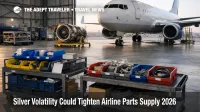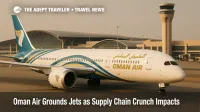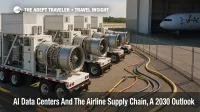Supply Chain Issues
The travel industry, a dynamic and multifaceted sector, has always relied on the smooth and synchronized operation of its supply chains. However, in recent times, the intricate networks that constitute the travel supply chain have faced unprecedented challenges, leading to a variety of issues that affect not only the service providers but also the travelers themselves. Understanding these supply chain disruptions within the travel industry offers a glimpse into the complexities that underpin the movement of people and resources across the globe.
Supply chain disruptions in the travel industry primarily manifest as delays, cancellations, or increased costs, each of which can significantly impact the travel experience. These issues trace their roots to several interrelated factors, including geopolitical tensions, unexpected global events, and natural disasters. Additionally, as travel resumes to pre-pandemic levels, overcrowded infrastructure and labor shortages contribute to a supply chain that is often stretched to its limits.
The Role of Geopolitical Tensions
Geopolitical tensions play a significant role in disrupting travel supply chains. Political instability or conflict in a region can lead to airspace closures, affecting airline routes and flight availability. Such changes often necessitate longer, less direct flights, resulting in increased fuel consumption and operational costs for airlines. Furthermore, heightened security measures at airports can lead to delays and longer wait times for passengers, disrupting schedules and causing customer dissatisfaction.
Additionally, countries engaged in trade wars or facing economic sanctions can experience interruptions in the import of essential goods, like aircraft parts or technological components for navigation systems. Such disruptions can lead to delays in aircraft maintenance or upgrades, negatively impacting airline operations. Consequently, travelers may face flight cancellations or reduced service options, leading to frustration and inconvenience.
Impact of Global Events
Global events, such as pandemics or economic crises, have a profound impact on travel supply chains. The COVID-19 pandemic, for instance, revealed the vulnerabilities within these networks. With travel restrictions, border closures, and lockdowns worldwide, airlines experienced unprecedented financial strain, leading to reduced routes, limited service, and in many cases, bankruptcy.
The pandemic triggered a domino effect, impacting hotels, car rental services, and tour operators, all integral components of the travel supply chain. With reduced airline capacity, hotels faced lower occupancy rates and financial instability. Car rental agencies, too, experienced decreased demand, resulting in fleet reductions that created shortages when travel began to recover.
Moreover, the reliance on global suppliers meant that any disruptions in the production or delivery of goods—such as hotel supplies or in-flight catering—exacerbated existing supply chain issues. Even as the world emerges from the pandemic, the aftershocks continue to affect the travel supply chain, with shortages in labor and increased operational costs presenting ongoing challenges.
Natural Disasters and Climate Change
Natural disasters have always posed a significant risk to travel supply chains, impacting everything from airline schedules to hotel operations. Hurricanes, earthquakes, and severe storms can lead to airport closures, road damage, and power outages, all of which disrupt transportation networks and accommodation services. For instance, a major snowstorm could ground flights, leaving travelers stranded and prompting a cascading effect on connecting flights and ground transportation.
Climate change exacerbates these challenges, as extreme weather events become more frequent and severe. Rising sea levels threaten coastal airports and tourist destinations, requiring costly infrastructure investments to mitigate potential damage. Additionally, temperature fluctuations can impact aircraft performance, leading to delays or cancellations, particularly in regions susceptible to rapid weather changes.
Labor Shortages and Infrastructure Overcrowding
Labor shortages within the travel industry further strain supply chains. The pandemic led to significant job losses across the sector, with many skilled workers leaving the industry altogether. As travel demand returns, airlines, airports, and hospitality services face difficulties in recruiting and retaining staff, leading to operational inefficiencies.
In airports, understaffing can result in longer processing times at check-in, security, and immigration, causing passenger delays and missed flights. Similarly, airlines with insufficient personnel to operate flights on schedule face delays or cancellations, reducing the reliability of air travel. In hotels, a shortage of housekeeping staff can lead to reduced service levels, affecting guest satisfaction.
Infrastructure overcrowding compounds these challenges, as airports and transportation networks struggle to accommodate increased traveler volumes. Many airports, especially in popular tourist destinations, operate at or near capacity, leading to congestion and logistical hurdles. Consequently, travelers face longer wait times and delayed flights, impacting their overall travel experience.
Technological Innovations and Mitigation Strategies
Despite these challenges, technological innovations provide potential solutions to mitigate supply chain disruptions in the travel industry. Airlines and hotels are increasingly adopting data analytics and artificial intelligence to streamline operations, optimize routes, and predict demand patterns. These technologies enable more efficient resource allocation, reducing delays and improving service reliability.
For example, airlines can use predictive analytics to anticipate maintenance needs, minimizing unexpected delays and cancellations. Similarly, hotels can implement smart reservation systems to manage occupancy and staffing levels efficiently, optimizing guest experiences even during peak travel periods.
Furthermore, collaboration among industry stakeholders is crucial for addressing supply chain issues. Airlines, airports, and government agencies must work together to develop contingency plans for natural disasters or geopolitical tensions, ensuring a coordinated response that minimizes disruptions. Investing in resilient infrastructure and sustainable practices can also safeguard the travel supply chain against future challenges.
Ultimately, while supply chain disruptions present significant obstacles for the travel industry, they also offer opportunities for innovation and improvement. By leveraging technology, enhancing collaboration, and adopting forward-thinking strategies, the industry can build a more robust and efficient supply chain that supports a seamless travel experience for millions of passengers worldwide.
Moon Palace Jamaica

KLM Deicing Fluid Shortage Disrupted Schiphol Flights

Silver Volatility Could Tighten Airline Parts Supply 2026

Netherlands China Nexperia chip dispute hits aviation parts

Oman Air Grounds Jets As Supply Chain Crunch Hits Schedules

FAA lifts Boeing 737 MAX production cap to 42 per month

IATA: Aircraft supply chain costs to hit $11 billion

Aircraft Shortages Through 2026: Airbus 62 jets, Boeing 47 Deliveries in July

Boeing Strike Threatens Jet Supply Chain

Boeing defense strike vote could ripple into trans-Pacific travel

AI Data Centers And The Airline Supply Chain, A 2030 Outlook

Boeing Strike Extends Supply Chain Disruptions and Impacts Air Travel

